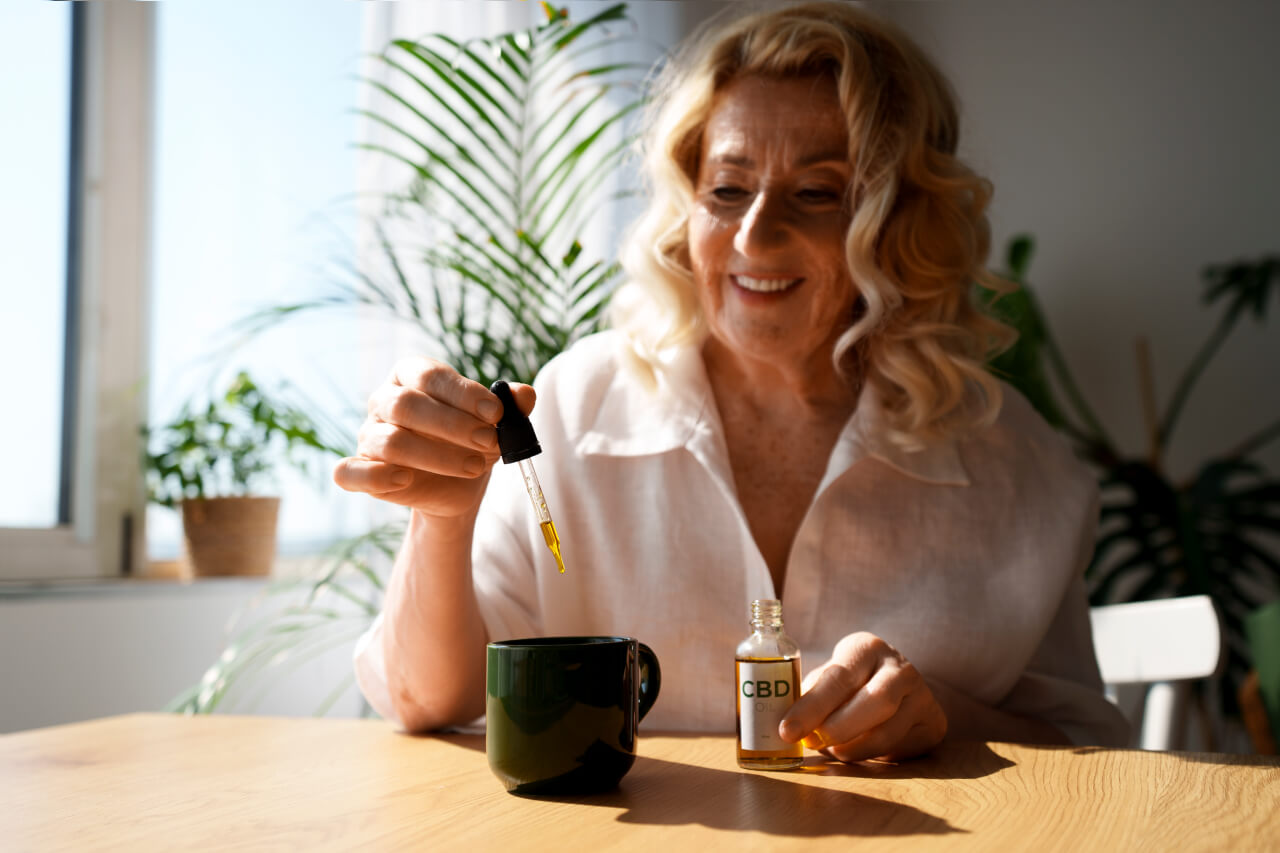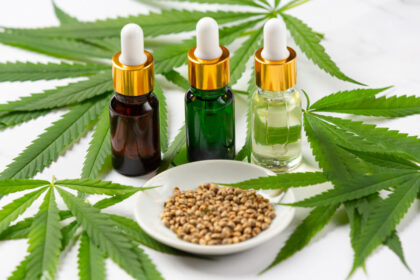Cannabidiol (CBD) is one of the many chemical compounds found in the cannabis plant, which includes both marijuana and hemp.
It belongs to a class of compounds called cannabinoids.
Unlike tetrahydrocannabinol (THC), another well-known cannabinoid, Cannabidiol (CBD) is not psychoactive, meaning it doesn’t produce a “high” or intoxication.
Cannabidiol (CBD) interacts with the endocannabinoid system (ECS) in the human body.
The ECS is involved in regulating various physiological processes, including mood, appetite, sleep, immune function, and pain sensation.
By influencing the activity of receptors in the ECS, CBD may have potential therapeutic benefits.
People use Cannabidiol (CBD) for a variety of reasons, and it is available in various forms, including oils, capsules, creams, and edibles. Some of the reported potential benefits of CBD include:
- Pain Relief: CBD may have analgesic (pain-relieving) properties and could be used to manage chronic pain.
- Anti-Inflammatory: CBD has anti-inflammatory properties, which might be helpful in conditions involving inflammation.
- Anxiety and Depression: Some studies suggest that CBD may have anxiolytic (anxiety-reducing) and antidepressant effects.
- Neuroprotective Properties: There is ongoing research into the potential neuroprotective effects of CBD, particularly in conditions such as epilepsy and neurodegenerative diseases.
- Anti-Seizure: Epidiolex, a prescription medicine containing CBD, has been approved by the U.S. Food and Drug Administration (FDA) for the treatment of certain rare forms of epilepsy.
While Cannabidiol (CBD) is generally considered safe, there are important considerations that individuals should be aware of before incorporating it into their daily routine.
In this article, we will explore seven crucial factors to consider when using CBD.
Understanding the Difference Between CBD and THC
Cannabidiol (CBD) and THC (tetrahydrocannabinol) are both cannabinoids found in the cannabis plant, but they have distinct differences, particularly in their effects on the body and mind.
Psychoactive Properties
CBD:
Unlike THC, CBD is not psychoactive. It does not produce the characteristic “high” or euphoria associated with cannabis use.
This lack of psychoactivity makes CBD an appealing option for individuals who want to experience potential therapeutic benefits without the altered mental state.
THC:
THC, on the other hand, is psychoactive and is responsible for the intoxicating effects commonly associated with marijuana use.
It binds to cannabinoid receptors in the brain, leading to the release of dopamine and the characteristic feeling of being “high.”
Medical Applications
CBD:
Cannabidiol (CBD) has gained attention for its potential therapeutic benefits, including anti-inflammatory, analgesic (pain-relieving), anxiolytic (anxiety-reducing), and neuroprotective properties.
It is being explored for various conditions such as chronic pain, anxiety disorders, epilepsy, and more.
THC:
While THC is also being investigated for medical applications, its psychoactive effects can limit its use in certain populations.
However, it is prescribed in some regions for conditions like chronic pain, nausea, and muscle spasticity.
Side Effects
CBD:
Cannabidiol (CBD) is generally well-tolerated, with few reported side effects. Some individuals may experience mild side effects such as fatigue, changes in appetite, or diarrhea.
THC:
THC can cause side effects such as impaired coordination, increased heart rate, dry mouth, red eyes, and memory and concentration issues.
These effects can vary depending on the individual and the dose.
Interaction with Cannabinoid Receptors
CBD:
Cannabidiol (CBD) interacts with cannabinoid receptors in the body, particularly CB1 and CB2 receptors of the endocannabinoid system.
However, it does not bind directly to these receptors and instead influences them indirectly.
THC:
THC binds directly to CB1 receptors, primarily found in the brain and central nervous system, which is responsible for its psychoactive effects.
Understanding these differences is crucial for individuals considering the use of cannabis-derived products for medicinal or wellness purposes.
While both CBD and THC offer potential benefits, their distinct properties make them suitable for different applications and user preferences.
The Legal Landscape of CBD
The legal landscape of Cannabidiol (CBD) varies significantly from one region to another, and it is subject to change as laws and regulations evolve.
The legality of Cannabidiol (CBD) is influenced by factors such as its source (hemp or marijuana), THC content, and the intended use of the product.
It’s essential for consumers to be aware of and understand the specific laws and regulations governing Cannabidiol (CBD) in their respective locations.
Additionally, the legal landscape is subject to change, so individuals should stay informed about any updates or amendments to existing regulations.
Consulting local authorities or legal professionals can provide accurate and up-to-date information on the legality of Cannabidiol (CBD) in a particular region.
Quality and Source of CBD Products
The Cannabidiol (CBD) market has experienced rapid growth, resulting in a plethora of products flooding the shelves.
However, not all Cannabidiol (CBD) products are created equal.
The quality and source of Cannabidiol (CBD) can significantly influence its effectiveness and safety.
Considering the quality and source of Cannabidiol (CBD) products before making a purchase is crucial for several reasons, ensuring you receive a safe, effective, and reliable product.
Here are key reasons why you should carefully evaluate the quality and source of CBD products:
Potency and Accuracy of Labeling
Third-party testing is essential to verify the accuracy of the CBD content stated on the product label.
High-quality CBD products are tested by independent labs, and the results should be easily accessible to consumers.
This ensures that you are getting the amount of CBD you expect and can adjust your dosage accordingly.
Absence of Contaminants
Inferior CBD products may contain contaminants such as pesticides, heavy metals, or residual solvents from the extraction process.
These contaminants can have adverse health effects.
Quality products are tested for purity, providing assurance that the product is free from harmful substances.
Source of Hemp
Hemp is a bioaccumulator, meaning it absorbs substances from the soil in which it grows.
The source of hemp is critical because it determines the quality of the CBD.
Hemp grown in nutrient-rich soil under strict agricultural guidelines is more likely to produce high-quality CBD.
Knowing the source of the hemp helps you assess the overall quality of the product.
Extraction Methods
The method used to extract CBD from the hemp plant can impact the quality of the final product.
CO2 extraction is considered one of the cleanest and most efficient methods, preserving the integrity of the CBD while avoiding the use of potentially harmful solvents.
High-quality products often disclose their extraction methods on the packaging or website.
Full-Spectrum, Broad-Spectrum, or Isolate
CBD products come in different forms, including full-spectrum, broad-spectrum, and isolate.
Full-spectrum products contain a range of cannabinoids and terpenes, potentially providing an enhanced “entourage effect.”
Broad-spectrum products contain multiple cannabinoids but no THC, while isolates contain only CBD.
Understanding these distinctions allows you to choose a product that aligns with your preferences and desired effects.
Consistency and Transparency
Reputable CBD manufacturers prioritize consistency and transparency.
They provide detailed information about their products, including the extraction process, source of hemp, and third-party testing results.
Consistency in product quality ensures that you can rely on the product’s effectiveness over time.
Avoiding Synthetic CBD
Some low-quality CBD products may contain synthetic cannabinoids, which can have unpredictable and potentially harmful effects.
Choosing products from reputable manufacturers reduces the risk of exposure to synthetic compounds.
Effectiveness and Desired Outcomes
The quality of the CBD product directly impacts its effectiveness in delivering the desired outcomes.
High-quality CBD from reputable sources is more likely to provide the potential therapeutic benefits associated with CBD, such as pain relief, anxiety reduction, and improved sleep.
By considering the quality and source of CBD products, you can make informed decisions that prioritize your health and well-being.
Researching and selecting products from reputable manufacturers who prioritize transparency and quality assurance contribute to a positive CBD experience.
Dosing and Finding the Right Balance
Considering dosing and finding the right balance is essential before buying CBD for several important reasons.
Achieving the desired effects and minimizing potential side effects depend on finding the appropriate dosage for your individual needs and circumstances. Here’s why you should carefully consider dosing and finding the right balance before purchasing CBD:
Individual Variability
Each person’s body reacts differently to CBD due to factors such as weight, metabolism, overall health, and the specific condition being addressed.
What works for one person may not work the same way for another. Therefore, finding the right balance involves determining the dosage that suits your individual characteristics and needs.
Optimizing Therapeutic Effects
CBD has a biphasic effect, meaning its effects can vary depending on the dosage.
While lower doses may produce one set of effects, higher doses may result in different outcomes.
Finding the right balance allows you to optimize the therapeutic effects you are seeking.
For example, lower doses may be more suitable for promoting relaxation, while higher doses may be necessary for managing certain types of pain.
Start Low, Go Slow
It is generally recommended to start with a low dose of CBD and gradually increase it until the desired effects are achieved.
Starting low and going slow helps minimize the risk of potential side effects and allows you to gauge your body’s response to CBD.
Minimizing Potential Side Effects
While CBD is generally well-tolerated, some individuals may experience side effects such as fatigue, changes in appetite, or diarrhea, especially at higher doses.
By carefully titrating the dosage, you can minimize the risk of side effects and find a balance that provides therapeutic benefits without unwanted reactions.
Cost-Effectiveness
CBD products can vary significantly in price, and higher doses may require larger quantities of the product.
By finding the right balance and determining an effective yet economical dosage, you can optimize the cost-effectiveness of your CBD use.
Consultation with Healthcare Professionals
Consulting with a healthcare professional can provide personalized guidance on dosing, especially if you are using CBD to address specific health conditions or if you are taking other medications.
Healthcare professionals can consider your medical history and potential interactions with medications to help you find the right balance.
Avoiding Tolerance and Dependence
Regularly reassessing your CBD dosage helps prevent the development of tolerance, where the body becomes accustomed to a certain dose and requires higher amounts for the same effects.
Additionally, finding the right balance can help you avoid dependence on CBD, ensuring that you use it as a tool for wellness rather than as a crutch.
Understanding Product Strengths
CBD products come in various concentrations and forms, such as oils, capsules, and edibles. Understanding the strength of the product allows you to calculate and adjust your dosage accurately.
Taking the time to consider dosing and finding the right balance ensures a more tailored and effective CBD experience.
It’s advisable to start with lower doses, monitor your body’s response, and make adjustments gradually based on your individual needs and goals.
If in doubt, seek guidance from healthcare professionals who can provide personalized advice
Potential Interactions with Medications
Considering potential interactions with medications is crucial before buying CBD to ensure your safety and the effectiveness of both CBD and any prescribed medications.
Here are important reasons why you should carefully evaluate potential interactions with medications before incorporating CBD into your routine:
CYP450 Enzyme Interaction
CBD interacts with the cytochrome P450 (CYP450) enzyme system in the liver.
This system is responsible for metabolizing many medications. CBD can inhibit or enhance the activity of these enzymes, potentially affecting the metabolism of certain drugs.
This interaction can lead to altered blood concentrations of medications, influencing their efficacy and potential side effects.
Medication Metabolism
If you are taking medications that are metabolized by the CYP450 enzymes, the introduction of CBD may affect their breakdown and elimination from the body.
This could result in higher or lower concentrations of the medications, potentially leading to unexpected effects.
Potential for Adverse Effects
Interactions between CBD and medications can increase the risk of adverse effects. For example, if CBD slows down the metabolism of a medication, it may accumulate in the body, potentially causing increased side effects. On the other hand, if CBD increases the metabolism of a medication, it might lead to reduced effectiveness.
Specific Medication Categories
Certain medications are known to interact with CBD more than others.
For example, anticoagulants, anti-seizure medications, and some antidepressants may be impacted by CBD interactions.
It’s important to be particularly cautious if you are taking medications in these categories.
Ignoring potential interactions may risk compromising the efficacy of your prescribed medications. Ensuring that CBD use is compatible with your current treatment plan helps maintain the intended therapeutic outcomes.
Individual Variability in Effects
Considering individual variability in effects is important before buying CBD because how a person responds to CBD can vary widely based on several factors. Understanding and taking into account these individual differences can significantly impact the effectiveness and overall experience of using CBD. Here are key reasons why individual variability in effects should be considered:
Unique Biochemistry
Each person has a unique biochemistry, which influences how the body processes and responds to substances like CBD. Genetic factors, metabolism, and overall health play a role in determining individual responses.
Differences in Endocannabinoid System (ECS)
The endocannabinoid system (ECS) varies from person to person.
The ECS is involved in regulating various physiological processes, and individual differences in its functioning can influence how CBD interacts with the body.
Body Weight and Composition
Body weight and composition can impact the distribution and absorption of CBD.
Generally, individuals with higher body weight may require different dosages than those with lower body weight to achieve similar effects.
Specific Health Conditions
The presence of specific health conditions can affect how the body responds to CBD.
For example, individuals with certain medical conditions may require different dosages or may experience varying levels of relief from symptoms.
Tolerance Levels
Tolerance to CBD can differ among individuals. Some people may be more sensitive to the effects of CBD, while others may require higher doses to achieve the desired outcomes.
Understanding your personal tolerance can help in adjusting dosage levels accordingly.
Purpose of Use
The intended purpose of using CBD can influence the optimal dosage. For instance, someone using CBD for mild stress relief may require a different dose than someone using it for chronic pain management.
Pre-existing Medications and Supplements
If you are taking other medications or supplements, they may interact with CBD differently based on individual factors. Considering these interactions is essential to avoid unexpected effects.
Preferred Effects
Different individuals may have varying preferences for the effects they seek from CBD. Some may be looking for relaxation and stress relief, while others may be using it for its potential anti-inflammatory or analgesic properties. Understanding your desired outcomes helps tailor your CBD use to meet your specific needs.
Trial and Error Approach
Due to individual variability, finding the right dosage and product may require a trial-and-error approach. Starting with a low dose and gradually increasing it while monitoring effects allows you to determine what works best for you.
Overall Wellness Goals
Individual wellness goals can influence the choice of CBD products and dosages.
Whether you are looking to enhance overall well-being, manage a specific health condition, or address a particular symptom, considering individual variability helps align your CBD use with your wellness goals.
Taking into account individual variability in effects ensures that your experience with CBD is tailored to your unique characteristics and goals.
It also emphasizes the importance of starting with lower doses, observing how your body responds, and making informed adjustments to optimize the benefits of CBD for your specific needs.
Potential Side Effects and Safety Considerations
While CBD is generally well-tolerated, some individuals may experience side effects.
These can include fatigue, changes in appetite, and diarrhea.
It’s essential to be aware of potential side effects and monitor how the body responds to CBD.
Additionally, pregnant or breastfeeding individuals should exercise caution and consult with a healthcare professional before using CBD, as the effects on fetal and infant development are not yet well-understood.
Conclusion
Choosing Cannabidiol (CBD) as a supplement or therapeutic aid requires careful consideration of various factors to ensure a safe and effective experience.
Understanding the fundamental difference between Cannabidiol (CBD) and THC is paramount, as it sets the foundation for selecting a product that aligns with individual preferences and health goals.
Equally important is navigating the legal landscape of Cannabidiol (CBD), as regulations vary across regions, impacting the sourcing, purchase, and use of CBD products.
Quality and source of Cannabidiol (CBD) products are critical considerations, influencing potency, purity, and overall effectiveness.
Prioritizing products that undergo third-party testing and originate from reputable sources ensures that you receive a reliable and contaminant-free product.
The extraction method, whether it’s CO2 extraction or another process, also contributes to the quality of the final product.
Dosing and finding the right balance are essential steps in optimizing the therapeutic benefits of Cannabidiol (CBD) while minimizing potential side effects.
The individual variability in effects underscores the importance of a personalized approach, starting with lower doses and gradually adjusting based on individual responses, body weight, and specific health conditions.
This approach not only enhances the likelihood of positive outcomes but also supports a cost-effective and tailored Cannabidiol (CBD) experience.
Moreover, being mindful of potential interactions with medications is crucial for those using prescription drugs.
CBD’s influence on the CYP450 enzyme system can affect the metabolism of medications, emphasizing the need for consultation with healthcare professionals to ensure a safe and harmonious integration of CBD into existing treatment plans.
Finally, acknowledging that the legal, scientific, and health landscapes surrounding CBD are dynamic and subject to change is key.
Staying informed about local regulations, new research findings, and individual responses contributes to a well-rounded and responsible approach to CBD use.
In the end, the considerations outlined—ranging from legal aspects and product quality to individual variability—provide a comprehensive guide for individuals seeking to make informed decisions about incorporating CBD into their lives.
By carefully weighing these factors, users can navigate the complex world of CBD products and harness the potential benefits of this compound in a manner that aligns with their unique needs and well-being goals.
FAQs
What is CBD, and what does it stand for?
CBD stands for Cannabidiol. It is a natural compound found in the cannabis plant, known for its potential therapeutic properties.
Will Cannabidiol (CBD) get me high?
No, Cannabidiol (CBD) is non-psychoactive, meaning it does not produce a “high” or intoxicating effect. THC is the compound responsible for the psychoactive effects associated with cannabis.
Are all Cannabidiol (CBD) products legal?
The legal status of Cannabidiol (CBD) varies. In many places, CBD derived from hemp with low THC content is legal. Check local regulations to ensure compliance.
How do I choose a quality Cannabidiol (CBD) product?
Look for products with third-party testing, clear labeling, and reputable sources. Consider extraction methods like CO2 extraction for quality assurance.
Can I take Cannabidiol (CBD) with other medications?
Consult with healthcare professionals before combining Cannabidiol (CBD) with medications. Cannabidiol (CBD) may interact with certain drugs through the CYP450 enzyme system.
How do I find the right Cannabidiol (CBD) dosage for me?
Start with a low dose and gradually increase. Individual responses vary, so finding the right balance minimizes potential side effects.
Can I use Cannabidiol (CBD) for specific health conditions?
Cannabidiol (CBD) is being researched for various health conditions, but its effectiveness can vary. Consult with healthcare professionals for personalized advice.





